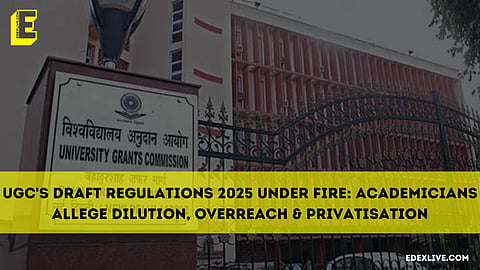

The University Grants Commission (UGC) recently unveiled its draft regulations for faculty qualifications and promotions in higher education, and the backlash has been swift and intense.
Teachers’ associations and experts have sounded alarms, pointing to what they describe as an erosion of academic standards, undue centralisation, and a push towards privatising education. These regulations, they argue, reflect an ideological shift that could drastically alter India’s higher education landscape.
A 'blueprint for overreach'?
Dr Avinash Kumar, a faculty at Jawaharlal Nehru University (JNU) and former Secretary of the JNU Teachers’ Association, criticised the draft regulations. According to him, the draft regulations go far beyond their mandate by attempting to dictate areas traditionally under state jurisdiction.
"The UGC’s role is to set minimum standards, not to interfere with the autonomy of state universities or legislate on appointments. By granting governors the authority to appoint vice-chancellors, it’s effectively undermining state governments and violating federal principles,” Dr Kumar argued.
He also took issue with the draft’s vague emphasis on “notable contributions” in academic assessments. "It’s not just about academic credentials anymore. This opens the door to ideological interference, where a candidate’s alignment with certain viewpoints could be prioritised over merit,” he said.
Privatisation and market orientation
Another contentious issue raised by Dr Kumar is the draft’s apparent tilt toward market-oriented policies. He explained how these regulations align with a broader shift towards privatisation.
"Emphasising industry experience and encouraging private-sector influence in appointments is like opening up the position of vice-chancellor to non-academicians, these regulations signal a departure from the public education ethos. This isn’t about improving education; it’s about opening universities to market-driven priorities at the expense of academic integrity,” he noted.
Additionally, the removal of the Academic Performance Indicators (API) system has raised eyebrows. While many found the API system flawed, Dr Kumar pointed out that its absence, combined with vague criteria for assessing faculty contributions, could lead to arbitrariness.
Teacher promotions: A missed opportunity?
Professor AK Bhagi, President of the Delhi University Teachers’ Association (DUTA) and National Democratic Teachers’ Front (NDTF) shared a more measured critique but didn’t hold back on key issues. He highlighted the draft’s failure to recognise the service of ad hoc teachers, many of whom have worked for years without job security.
"These teachers are the backbone of our institutions. Ignoring their contributions in promotion policies is a grave oversight,” he said.
He also criticised the nine promotion parameters outlined in Clause 3.8 of the regulations. According to Prof Bhagi, "The framework focuses too heavily on quantitative metrics while ignoring qualitative contributions like mentoring students, participating in university governance, or community outreach.”
“We contribute significantly to corporate life through committees, NCC (National Cadet Corps), and NSS (National Service Scheme), and these efforts must be recognised in promotion assessments,” he added.
Prof Bhagi proposed that sincerity and regularity in teaching should be added as key criteria. He also called for mechanisms to factor in past service by ad hoc teachers when considering promotions.
The UGC NET debate
A particularly controversial aspect of the draft is the removal of the UGC - National Eligibility Test (NET) as a mandatory qualification for assistant professors. Dr Kumar described this move as a "dilution of standards" that risks undermining the academic ecosystem. He added that the decision to allow PhD admissions directly after a four-year undergraduate degree further exacerbates concerns about declining research quality.
Prof Bhagi also shared his apprehensions, emphasising the importance of standardised benchmarks in ensuring teaching and research quality. "While reforms are necessary, this move could have unintended consequences, such as reducing the competitiveness and rigour of faculty appointments,” he warned.
Privatisation, centralisation, and the path forward
Dr Kumar described the draft as part of a larger ideological project aimed at centralising control over India’s higher education system. He warned of a "trickle-down effect" that could ultimately stifle academic freedom and critical thinking.
Prof Bhagi, however, remained cautiously optimistic. He emphasised the importance of constructive engagement with the UGC to ensure these regulations reflect the ground realities faced by educators. "We need a united front — consultations, concrete suggestions and all sorts of democratic ways to push for amendments that protect academic autonomy and public education,” he said.
For an in-depth perspective from the UGC's viewpoint, read the exclusive interview with UGC Chairman Prof Mamidala Jagadesh Kumar on the draft regulations here:
